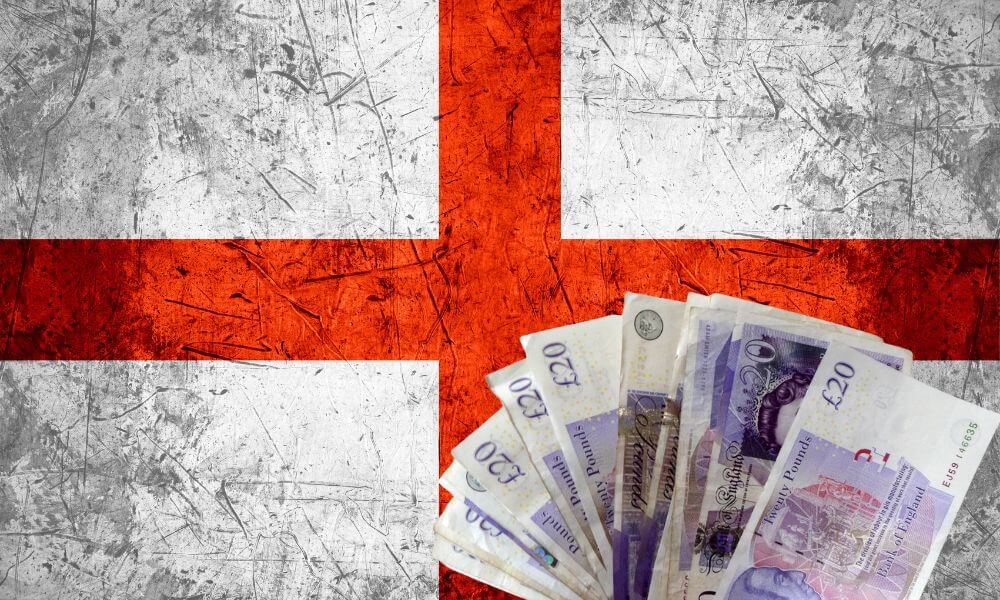The currency of England is the pound sterling. Every pound is subdivided into 100 pennies. This currency is really the currency of the United Kingdom, and not just of England, of which England is a member country. Scotland, Wales, and Northern Ireland use the same pounds.
The pound sterling is one of the most internationally traded currencies in the world.
The word “sterling” refers to the currency as a whole, whereas the “pound” is a unit of account along with the penny.
It is issued by the Bank of England and is most commonly referred to as a “quid” in English slang.
Let’s find out more.

What is the currency of England?
The currency of England, and indeed of the whole United Kingdom, is the pound sterling.
The pound is the primary unit of sterling, so the sterling is the name of the currency more generally.
It is the world’s oldest currency that is still in use, with bank notes having been issued by the Bank of England for more than 300 years.
The first pound coin was minted under Henry VII in 1489.
It is the fourth most traded currency in the world today, after the US dollar, euro and the Japanese Yen.
It is one of the basket of currencies, then, which calculates the value of the special drawing rights of the IMF.
The Bank of England is the central bank of the United Kingdom and is responsible for issuing of all notes and coins in England.
In Scotland and Northern Ireland, they regulate the issuing of currency by private banks.
So, in Northern Ireland and Scotland, you will find banknotes and coins that are different, but they are the same currency.
In Wales, all banknotes are issued by the Bank of England and no private banks issue their own denominations.
No one is quite sure where the term “sterling” comes from, though there are a few theories.
The OED states that the most likely explanation is that it comes from the Old English word steorra meaning star, with the “ling” suffix to create “little star”. In Norman England, silver pennies bearing a small star were in wide circulation.
Many different slang terms have been used for sterling over time, though the most common one by a long way today is “quid”.
This is used just about everywhere in the country.
You may also hear them referred to as “bob”, though this is more archaic.
Is it the pound or the sterling?
The pound and the sterling are the same thing.
In general everyday conversation, though, you are very unlikely to ever hear a British person refer to them as sterling.
Unless a slang term is used, the term “pound” is always going to be what is used.
However, the distinction is that the pound is the individual unit of the currency, and the sterling is the name of the currency more generally.
So, each pound is split into one hundred pennies.
Both the pound and the penny are sterling, but they are not the same as one another in terms of the denominations.
Again, though, if this confuses you at all, just forget entirely about the term “sterling”—you will not need to use it while you’re in the country.
The currency in England and Britain is the pound, and this is what everyone calls it.
The ISO code for the currency is GBP, meaning Great British Pound.
The term sterling is not particularly important except in the context of international trade on a large level, and unlike the dollar, there are far fewer variants of “pound” currencies that you are at risk of getting mixed up with.
Does England use Euros?
England does not use Euros and it never has.
As of now, the United Kingdom is no longer a member of the European Union, let alone using its currency.
For the whole time that the UK was a member state, though, of the EU, it still never adopted the Euro.
There were a great many reasons and justifications for this, including the simple fact of the sterling’s historical value and heritage and not wanting to break 600 years of contiguous use.
Now, though, as Britain as left the EU, there is no chance of the nation adopting the Euro.
Why is a pound called a quid?
Again, we aren’t entirely sure where this slang term comes from.
It’s believed that it may trace back to Quidhampton, a village in England which was once home to a paper mill of the Royal Mint.
It’s more likely, though, that it derives from the Latin quid, meaning simply “what” or “something” as in quid pro quo.
It was first recorded in use in the 1680s, and so unfortunately the precise origin for the meaning of the slang is lost to us.
Nonetheless, again, everyone in the country continues to use it and it is among the most common slang for pound across Britain.
So, it might go by a few different names, then, but the ultimate currency being referred to is the same.
England never adopted the Euro even when they were a member of the European Union, which they no longer are.
Pounds are among the most traded currency in the world and serve a very important place in the global economy, and are used not just in England but across the whole of the United Kingdom, though issued by different banks.

